Baptist Church
 From Nwe
From Nwe The Baptist Church is a Christian denomination—or group of denominations—that rejects the traditional practice of infant baptism and holds that followers of Jesus Christ are to be immersed in water as a conscious affirmation of their faith. The term Baptist has its origins with the European Anabaptists of the sixteenth century, but the modern Baptist denomination is more closely linked to the English Separatist movement of the seventeenth century.
The focus of Baptist church services is the proclamation of the Gospel message through the weekly sermon. Organizationally, Baptist churches operate according to the congregationalist governance system, giving autonomy to individual local churches. However, Baptist churches are often associated in denominational groups such as the Southern Baptist Convention, National Baptist Convention USA, Conservative Baptist Association of America, American Baptist Churches USA, or American Baptist Association (Landmark Baptists), among others. Baptists usually are considered Protestants, although a minority of Baptists reject that term.
History
Baptists generally believe that the New Testament churches were of baptist character. In other words, Jesus and his disciples were all baptized by immersion as adults, and so were the members or the primitive Christian church. The modern-day Baptist churches are thus restorers of New Testament practices.

The modern Baptist movement, however, is descended either from the sixteenth-century Anabaptists and/or from the English Separatists of the seventeenth century. The Anabaptists were comprised of widely scattered churches in Europe who rejected infant baptism. They therefore "re-baptized" their members as adults. Anabaptists held to many of the teachings of modern-day Baptists, such as believer's baptism by immersion and freedom of religion.
Some historians see the Anabaptists and Baptists as one and the same people. Others, pointing to differences between the Anabaptists of continental Europe and the English Baptists—such as the Anabaptists' commitment to pacifism—see the Anabaptists only as influencing the later Baptists, rather than being directly connected to them.
The Separatists were English Protestants in the century who considered it their religious duty to separate completely from the Church of England, in contrast to other Puritans who sought to purify the Church of England from within. In 1608, to avoid persecution, John Smyth led a group of separatists to the more tolerant Dutch Republic where a distinctive Baptist faith emerged among these English émigrés. Open debate among them, together with close contact and interaction with continental Anabaptists, led the congregation to question the meaning and practice of baptism. John Smyth became convinced that baptism should be for conscious Christian believers only, and not for infants. The other English émigrés agreed. Meanwhile, Thomas Helwys and a dozen or so others began to formulate the earliest Baptist confessions of faith: 27 articles were included in "A Declaration of Faith of English people remaining at Amsterdam in Holland" (1611). Helwys and 12 Baptist émigrés returned to England, and in 1612 they founded a Baptist congregation in Spitalfields, London. They became known as the General Baptists and subscribed to an Arminian theology, which rejected Calvinistdoctrines of predestination. In 1616, Henry Jacob led a group of Puritans in England to establish the Particular Baptists, with a more strictly Calvinist theology.
The Baptist churches in America
The person probably most responsible for the development of the modern Baptist denomination, however, was Roger Williams. In June 1636, Williams established the future town of Providence, Rhode Island, where he later created perhaps the first Baptist congregation in America and also established the first colony committed to the principle of freedom of religion. In these circumstances, the Baptist doctrine, which was considered a heresy by Massachusetts Puritans, flourished.
Both Roger Williams and his compatriot in working for religious freedom, Dr. John Clarke, are variously credited as founding the earliest Baptist church in America. [1] In 1639, Williams established a Baptist church in Providence, Rhode Island and Clarke began a Baptist church in Newport, Rhode Island. There is considerable debate as to which church was actually established first.[2]
In the next century, when the Great Awakening swept across the American countryside, it encouraged people to adopt a more independent stance with regards to religious matters. This proved beneficial for newer, more radical churches like the Baptists. The Baptists were an important force in establishing the principle of separation of church and state after the American Revolution, and the Baptist denomination soon became a mainstream Christian church in the U.S., while its doctrine was still considered heretical in Europe.
Baptists adopted an anti-creedal theology in which all authority stems from the Bible. Common characteristics include: baptism of mature adults rather than children, baptism via full immersion, religious revivals, and the independence of local churches. So strong was this independent streak that the first national Baptist organization in the United States was not created until 1814. In 1845, however, the American Baptists split over the issue of slavery. Several groupings of Baptist churches would soon emerge, but many remained unaffiliated as community churches.
U.S. Baptist groups
The majority of Baptists worldwide reside in the United States, an estimated 47 million. The majority of U.S. Baptists live in the southern United States, and the Baptist church has historically exerted a powerful influence in that region of the country. According to a poll in the 1990s, about one in five adults in the United States claims to be a Baptist. U.S. Baptists are represented in more than 50 separate groups. Ninety-two percent of Baptists are found in five of those bodies—the Southern Baptist Convention (SBC); National Baptist Convention, USA, Inc. (NBC); National Baptist Convention of America, Inc.; (NBCA); American Baptist Churches in the USA (ABC); and the Baptist Bible Fellowship International (BBFI).
Major Baptist organizations in the U.S. are:
Southern Baptist Convention: The Southern Baptist Convention (SBC) is a U.S.-based denomination consisting of numerous agencies, including six seminaries, two mission boards, and a variety of other organizations. Established in 1845 in order to preserve a religious basis for human slavery, the SBC originally did not interfere in other theological matters, but has grown to be among the most theologically conservative Baptist groups. It affirms a fundamentalist outlook toward the Bible and basic Christian doctrines, to which its member churches are supposed to adhere. There are more Southern Baptist congregations in America than of any other religious group, including the Roman Catholic Church (although in terms of members Catholics are far more numerous). The SBC claims to have more than 16.3 million members in 44,000 churches throughout the US.
National Baptist Convention, USA, Inc.: Founded in 1886, the National Baptist Convention, USA (NBC) is not a denomination but a voluntary federation of churches. It is the nation’s oldest and largest African-American religious convention with an estimated membership of 7.5 million. The convention is defined by its ideal of voluntary membership and participation at both the organization and individual member levels. The Convention does not prescribe nor exercise administrative or doctrinal control over any of its membership; these matters are left for the attention of local organization and church authorities.
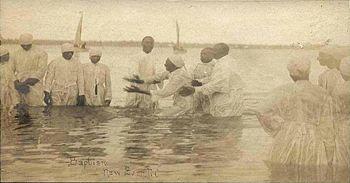
National Baptist Convention of America, Inc.: The National Baptist Convention of America, Inc. (NBCA) is an African-American Baptist body organized in 1915, which separated from the larger NBC over the question of the independence of the convention's publishing board. With about 1,700,000 members in 6,716 churches, it is currently the second-largest black denomination in the United States, next to the Church of God in Christ. Along with other independent African-American Baptist churches, its churches were founded by free slaves after the Civil War and have long played an important role in the political and social lives of African-Americans.
American Baptist Churches USA: The American Baptist Churches USA (ABCUSA) is a Baptist denomination with its headquarters in Valley Forge, Pennsylvania. Originally known as the Northern Baptist Convention, it was established in 1907. It is currently the fourth largest group of Baptists in the United States and it is also the most liberal. It consists of a federated body of otherwise independent churches which are united in their belief in adult baptism (by immersion) and the independence of local congregations. The ABCUSA is a member of the National Council of Churches and the Baptist World Alliance. In 2006, the denomination had approximately 1.4 million members in 5780 churches.
Baptist Bible Fellowship International: The Baptist Bible Fellowship International (BBFI) is an evangelical-fundamentalist Baptist organization formed in 1950 by members who separated from the World Baptist Fellowship. With headquarters in Springfield, Missouri, the structure of BBFI makes it actually a fellowship of pastors rather than churches. The stated purpose of the Fellowship is to obey both the letter and the spirit of the Great Commission of Matthew 28:18-20. The Fellowship owns the original Baptist Bible College, as well as Boston Baptist College.
Other Baptist groups include:
- Alliance of Baptists: The Alliance of Baptists is a fellowship of Baptist churches and individuals espousing moderate-to-liberal theological and social stances. The Alliance was formed in 1987 by congregations in schism from the Southern Baptist Convention as a result of a controversy between fundamentalists and moderates in the 1980s. The Alliance maintains headquarters in Washington, D.C. As of 2007, some 125 congregations are affiliated with the Alliance; a preponderance of them are in southern Atlantic states such as Maryland, Virginia and North Carolina. The Alliance is more sparsely found in the central South and Texas; in those areas, Alliance congregations are found almost exclusively in metropolitan areas.
- American Baptist Association: Not to be confused with the American Baptist Churches USA, the American Baptist Association (ABA) is an association of independent Landmark Baptist churches. Most churches participate in local and state associations in addition to the national body. The numerical strength of the American Baptist Association is in the Old Southwest—Arkansas, Louisiana, Oklahoma, and Texas—but there are several churches in California, Florida, and other states. Landmark Baptists do not recognize the validity of churches which do not practice adult or "believer's baptism" by immersion. Many Landmark churches also reject the label "Protestant."
- Baptist General Conference: The Baptist General Conference (BGC) is a national evangelical Baptist body with roots in Pietism in Sweden and inroads among evangelical Scandinavian-Americans, particularly persons located in the American Upper Midwest. The BGC has grown to a nation wide association of autonomous churches with at least 17 ethnic groups and missions in 19 nations. In 2006, the BGC had 194,000 members in 950 churches in the United States. There are a further 105 churches in Canada organized into 5 district bodies. These congregations cooperate together nationally through the Baptist General Conference of Canada.
- Conservative Baptist Association: The Conservative Baptist Association (CBA) emerged as part of the continuing fundamentalist/modernist controversy within the Northern Baptist Convention. The first organization of Conservative Baptists was the Conservative Baptist Foreign Mission Society (CBFMS), now called WorldVenture, formed in Chicago, Illinois in 1943. The Conservative Baptist Association of America was organized in Atlantic City, New Jersey in 1947. The Association now operates under the name CBAmerica. In 2003, the Association had over 1200 churches and over 200,000 members.

- Cooperative Baptist Fellowship: The Cooperative Baptist Fellowship (CBF} is not a denomination but rather a fellowship of churches and Christians. Valuing autonomy and freedom, CBF does not have or exercise authority over its partnering churches and individuals. In opposition to the Southern Baptist insistence that only men be pastors, the belief that God calls both men and women into ministry was one of the founding principles of CBF. The Cooperative Baptist Fellowship claims approximately 1,900 partner churches.
- Progressive National Baptist Convention: The Progressive National Baptist Convention (PNBC) is a convention of African-American Baptists emphasizing civil rights and social justice. The PNBC has followed a path of political activism, supporting groups such as the National Association for the Advancement of Colored People and methods such as affirmative action. The PBNC has partnered with the predominantly white American Baptist Churches in the USA since 1970 and is a member of the National Council of Churches and the Baptist World Alliance.
- Independent Baptist Churches: There are several million Baptists in America who are “unaccounted for.” This means that they are not members of a known Baptist organization. Baptists have traditionally been suspicious any ecumenical movements designed to mediate theological differences between denominations, even when it comes to other Baptists, so it’s only to be expected that there will be Baptist churches who continue to be under the radar of religious surveys.
Baptists around the world
There are over 47 million Baptists outside of the United States, with worldwide congregations totaling nearly 300,000.
Large populations of Baptists exist in Asia, Africa, and Latin America, notably in India (2.4 million), Nigeria (2.3 million), Democratic Republic of the Congo (1.9 million), and Brazil (1.5 million). In England, where modern Baptists got their start, their numbers have been reduced to a few tens of thousands.
One country outside of the United States where Baptists play a very public role is Russia. However, they have also faced serious challenges there, due to opposition from the Russian Orthodox Church, which considers them to be heretics and also objects strongly to “outsiders” who take away adherents.
Additional countries where major Baptist ministries are found, include: Austria, Belgium, Bulgaria, Greece, Hungary, Slovakia, Italy, Spain, Czech Republic, Lebanon, Switzerland, Denmark, The Netherlands, Tanzania, France, Norway, Ukraine, Germany, Portugal, United Arab Emirates, and Romania.
The Baptist World Alliance is a worldwide alliance of Baptist churches and organizations, formed in 1905 at Exeter Hall in London during the first Baptist World Congress. World conflicts made it impossible to hold to a strict five-year plan, but 19 Congresses have been held, London, 1905; Philadelphia, 1911; Stockholm, 1923; Toronto, 1928; Berlin, 1934; Atlanta, 1939; Copenhagen, 1947; Cleveland, 1950; London, 1955; Rio de Janeiro, 1960; Miami Beach, 1965; Tokyo, 1970; Stockholm, 1975; Toronto, 1980; Los Angeles, 1985; Seoul, 1990; Buenos Aires, 1995; Melbourne, 2000; and Birmingham, England, 2005.
Currently the Baptist World Alliance serves as a global fellowship of Baptists, uniting 210 Baptist groups that they claim represent over 47 million baptized believers in more than 200 countries.
Distinctive Beliefs
The most distinctive doctrine of the Baptist churches is the rejection of infant baptism. Traditional churches, because of the doctrine of Original Sin affected even innocent children, baptize infants in order to prevent them from going the Hell in case of early death. Baptists insist that baptism is only for those who have come to their faith through a conscious, voluntary commitment. Nowhere in the New Testament, they point out, do we read of infants being baptized. Today, the controversy over infant baptism continues, with the Catholic church and many Protestant denominations considering the absence of infant baptism in the Baptist churches to be a heresy.
Baptist churches do not have a central governing authority. Therefore, beliefs are not totally consistent from one Baptist church to another, especially beliefs that may be considered minor. However, on major theological issues, Baptist distinctive beliefs are held in common among almost all Baptist churches. Baptists share so-called "orthodox" Christian beliefs with most other moderate or conservative Christian denominations. These would include beliefs about one God, the virgin birth of Jesus, his vicarious atoning death and bodily resurrection, the Trinity, grace, the Kingdom of God, the resurrection of the dead, evangelism, and missions. Some historically significant Baptist doctrinal documents include the 1689 London Baptist Confession of Faith, the 1833 New Hampshire Baptist Confession of Faith, the Southern Baptist Convention's Baptist Faith and Message, and written church "covenants" which some individual Baptist churches adopt as a statement of their faith and beliefs. Baptists generally, but not in all cases, believe in the literal Second Coming of Christ and the Final Judgment.
Most Baptist traditions also believe in the "Four Freedoms" articulated by Baptist historian Walter B. Shurden:[3]
- Soul freedom: the soul is competent before God, and capable of making decisions in matters of faith without coercion or compulsion by any larger religious or civil body
- Church freedom: freedom of the local church from outside interference, whether government or civilian (subject only to the law where it does not interfere with the religious teachings and practices of the church)
- Bible freedom: the individual is free to interpret the Bible for himself or herself, using the best tools of scholarship and biblical study available to the individual
- Religious freedom: the individual is free to choose whether to practice their religion, another religion, or no religion; Separation of church and state is often called the "civil corollary" of religious freedom
The label Protestant is rejected by some Baptists (primarily those in the Landmark movement) because in their view Baptists have existed separately since the early church days. Those holding this view maintain that Baptists have never been a part of the Roman Catholic Church, and as such are not "protesting" against Catholicism. Further, they point out that Baptists have no direct connection to any of the Reformationists like Luther, Calvin, or Zwingli.
Other Baptists accept the Protestant label as a demographic concept that describes churches who share similar theologies of sola scriptura, sola fide, the priesthood of all believers and other positions that Luther, Calvin, and other traditional reformers held in contrast to the Roman Catholic Church in the 1500s.
Worship style
The general worship service is usually preceded by a time of Sunday School during which the people divide into separate classes (usually based on age) for study of the Bible. After the Sunday school, the whole church often meets for a period of worship. However, a growing number of churches have a separate worship service for the children.
The worship service generally consists of a sermon preceded by a time of worship through singing. Prayers are offered intermittently throughout the service and an offering is usually taken sometime during the service. An "invitation" is usually offered after the sermon to allow public response to the message by confession of faith, request for baptism or church membership, or the expression of an intention to walk more closely with the Lord. The music in Baptist churches varies from traditional hymns, to southern or Negro gospel, to the more contemporary rock and charismatic music styles.
Baptist churches are careful to emphasize that worship is not limited to the Sunday gathering, but is a lifestyle of love and service to Christ and dedication to God's truth as revealed in the Scriptures. Most Baptist churches expect the members to carry the message of the gospel into the world among their family and friends.
Membership
Only those people who are baptized members of a local Baptist church are included in the total number of Baptists. Most Baptist churches do not have an age restriction on membership, but will not accept as a member a child that is considered too young to fully understand and make a profession of faith of their own volition and comprehension. In such cases, the pastor and parents usually meet together with the child to verify the child's comprehension of the decision to follow Jesus. There are instances where a person makes a profession of faith, but fails to follow through with the believers' baptism. In such cases, they are considered "saved" but not a church member until baptized. If children and unbaptized congregants were counted, world Baptists may number over 120 million.
Notes
- ↑ Dr. John Clarke . www.redwoodlibrary.org. Retrieved October 20, 2007.
- ↑ William H. Brackney. Baptists in North America: an historical perspective. (Oxford, UK: Blackwell Publishing, 2006), 23.
- ↑ Walter B. Shurden. The Baptist Identity: Four Fragile Freedoms. (Macon, GA: Smyth & Helwys Publishing; Bilingual edition, 1997).
References
ISBN links support NWE through referral fees
- Brackney, William H. Baptists in North America: an historical perspective. Oxford, UK: Blackwell Publishing, 2006. ISBN 1405118652
- Hiscox, Edward T. Principles and Practices for Baptist Churches: A Guide to the Administration of Baptist Churches. Grand Rapids, MI: Kregel Classics Reprint Services, 1980. ISBN 978-0825428609
- Hobbs, Herschel H. What Baptists Believe. Nashville, TN: B&H Publishing Group, 1964. ISBN 978-0805481013
- Maring, Norman H. A Baptist Manual of Polity and Practice. Valley Forge, PA: Judson Press, 1991. ISBN 978-0817011710
- McNutt, William Roy. Polity and Practice in Baptist Churches. Valley Forge, PA: Judson Press; [Rev.] edition, 1959. ASIN B0006AVY4A
- Norman, R. Stanton. The Baptist Way: Distinctives of a Baptist Church. Nashville, TN: B&H Publishing Group, 2005. ISBN 978-0805431520
- Shurden, Walter B. The Baptist Identity: Four Fragile Freedoms. Macon, GA: Smyth & Helwys Publishing; Bilingual edition, 1997. ISBN 978-1573120227
External links
All links retrieved December 31, 2021.
- A comprehensive independent Baptist Church Web Portal and Church Search Engine. www.baptist-ministries.org.
- Baptist History and Heritage Society. www.baptisthistory.org.
- Doctrinal and Historical Information on Baptists. www.baptistbecause.com.
- Baptist Studies Online. www.baptiststudiesonline.com.
Credits
New World Encyclopedia writers and editors rewrote and completed the Wikipedia article in accordance with New World Encyclopedia standards. This article abides by terms of the Creative Commons CC-by-sa 3.0 License (CC-by-sa), which may be used and disseminated with proper attribution. Credit is due under the terms of this license that can reference both the New World Encyclopedia contributors and the selfless volunteer contributors of the Wikimedia Foundation. To cite this article click here for a list of acceptable citing formats.The history of earlier contributions by wikipedians is accessible to researchers here:
The history of this article since it was imported to New World Encyclopedia:
Note: Some restrictions may apply to use of individual images which are separately licensed.
↧ Download as ZWI file | Last modified: 02/04/2023 03:30:42 | 106 views
☰ Source: https://www.newworldencyclopedia.org/entry/Baptist_church | License: CC BY-SA 3.0
 ZWI signed:
ZWI signed: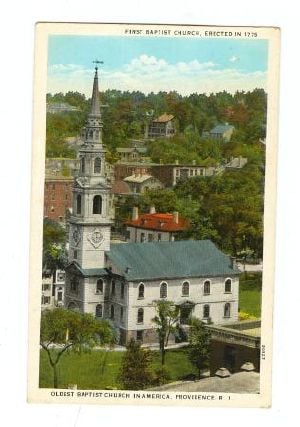
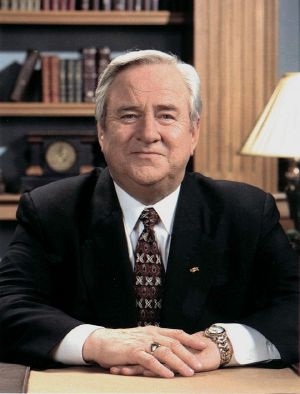
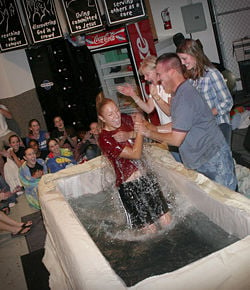
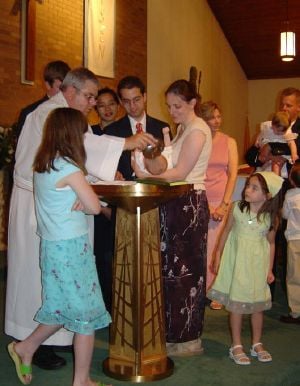
 KSF
KSF